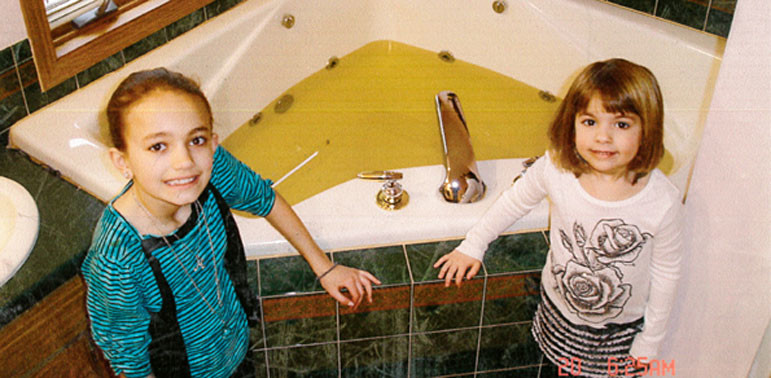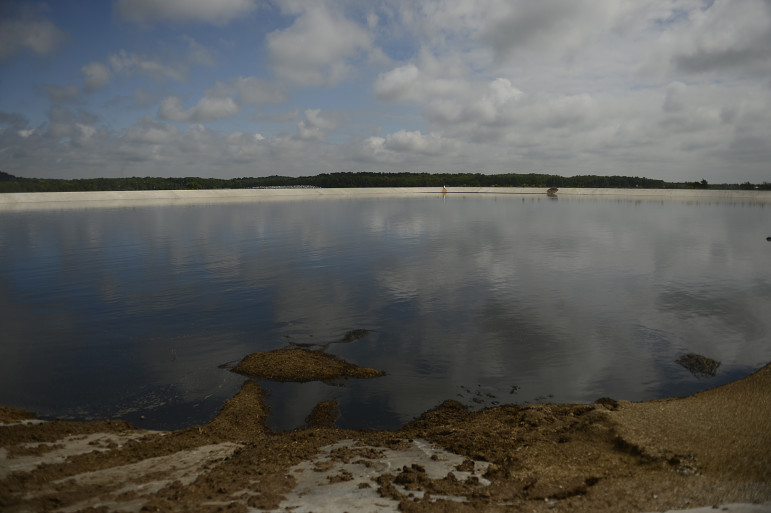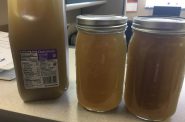Bacteria Taints State’s Drinking Water
169,00 households served by private wells that tested positive for coliform bacteria.
One-third of wells unsafe
Recent testing funded by the DNR and carried out by the University of Wisconsin-Oshkosh showed the extent of the problem in Kewaunee County, with more than one-third of the 320 wells tested found unsafe to use. Those 110 wells had unsafe levels of coliform, E. coli or nitrate.
Any amount of coliform is considered unsafe. Of the wells found to be unsafe by the DNR testing, 27 percent had coliform; and five wells, or 2 percent, were contaminated by E. coli, which can come from human or animal waste. The second phase of the study will show the exact source of the pollutants.
Chuck Wagner discovered in the most recent round of testing that his new well — which he built in 2013 to replace an old contaminated well — is now tainted by four bovine viruses as well as nitrate.

Chuck Wagner’s granddaughters, Mackayla, left, and Maggie DeBaker, pose with polluted well water from his Kewaunee County home around 2010. In 2013, Wagner had a new, deeper well drilled at a cost of $10,000. The new well has also become polluted with viruses from cattle manure, and he now uses a reverse osmosis system to filter the water before drinking or cooking. Photo courtesy of Chuck Wagner.
Wagner, who served for 10 years on the state’s Land and Water Conservation Board, said he is convinced clean water and agriculture can exist side by side, but he and other residents are tired of what they say is inaction by the DNR.
“We’re getting mad,” Wagner said.
As for the Tremls, the family eventually was awarded an $80,000 settlement from the insurance company for Stahl Farms, which spread the manure that sent Samantha, now 12, to the hospital. Judy Treml said her family moved to Green Bay over concerns that the water in heavily farmed Kewaunee County is unsafe. The farm also paid a $50,000 fine to the state for violating its DNR permit.
Treml said she believes her family’s move away from Kewaunee County was the right decision.
“This past summer several families had wells that were contaminated because of malfunctions at a farm manure lagoon,” she said. “In Kewaunee County, the problems have gotten even more horrific. In 10 years, it hasn’t improved at all.”
Big farms, big waste
Kewaunee County is home to 20,574 people and 76,000 cows, according to county data. It has one of Wisconsin’s highest concentrations of large dairy farms, known as Concentrated Animal Feeding Operations or CAFOs. Such farms, which have up to 8,000 head of cattle, can produce as much feces as a city, and most of it ends up on nearby farm fields.
Kewaunee County’s 16 CAFOs contribute the bulk of the more than 555 million gallons of liquid manure that are spread on the county’s fields each year, county figures show.

Waste is stored in a manure lagoon at the Kinnard Farms Inc. expansion site in the town of Lincoln in Kewaunee County in 2015. Kinnard Farms has become a target of environmental groups who are concerned that such concentrated animal feeding operations are polluting groundwater. Photo by Evan Siegle of the USA TODAY NETWORK-Wisconsin.
The likelihood that manure from such large farms will contain one or more pathogens is “very high,” according to the EPA, because of the sheer number of animals housed in such operations.
Manure is a veritable stew of more than 150 pathogens that can make people sick, according to a report from the National Association of Local Boards of Health and the U.S. Centers for Disease Control and Prevention.
These pathogens include E. coli, Salmonella, Giardia and Cryptosporidium. All can cause severe diarrhea and can be deadly for those with weakened immune systems. Infants and young children, pregnant women, the elderly, people who are HIV-positive and those who have undergone chemotherapy — about 20 percent of the U.S. population — are most at risk.
Tainted Water
-
Fecal Microbes In 60% of Sampled Wells
 Jun 12th, 2017 by Coburn Dukehart
Jun 12th, 2017 by Coburn Dukehart
-
State’s Failures On Lead Pipes
 Jan 15th, 2017 by Cara Lombardo and Dee J. Hall
Jan 15th, 2017 by Cara Lombardo and Dee J. Hall
-
Lax Rules Expose Kids To Lead-Tainted Water
 Dec 19th, 2016 by Cara Lombardo and Dee J. Hall
Dec 19th, 2016 by Cara Lombardo and Dee J. Hall

















My only problem with this article is the headline… As the DNR graph points out, most bacteria isn’t problematic. And you better believe city water – ALL water, for that matter – is “tainted” with bacteria of some form. A more appropriate title may have included the word ‘dangerous’ or a synonym.
Otherwise, sucks for the well drinkers – a majority of wisconsinites. Hopefully some of the outlined solutions can help with thr coliform problem.
Thank god we have a state DNR with scientists that can regulate the huge agribusinesses where….Oh, wait, what’s that? Oops.
Wisconsin is fast becoming an unsafe place to live. We have bad water wells in Kewaunee County and also wells in Racine County polluted by the use of coal ash for back fill around buildings and roadways. The DNR does not seem to have the personal or the interest to identify and fix the problems. In the South West quarter of Wisconsin we are mining the silica sand that is used in the frack mining industry. The levels of dust in the air are not controlled well and the silica material is a health hazard. Lakes and rivers and water wells are drying up because of high capacity wells that are used in the farming and mining industry.
Yes there have always been problems but these things are new and accelerating in number.